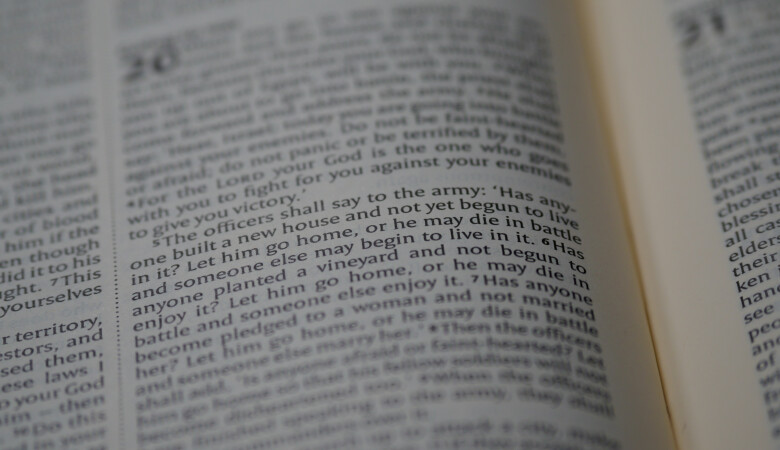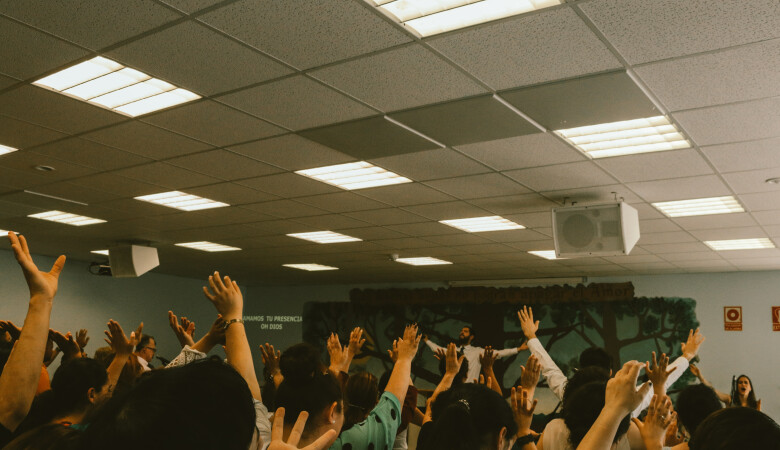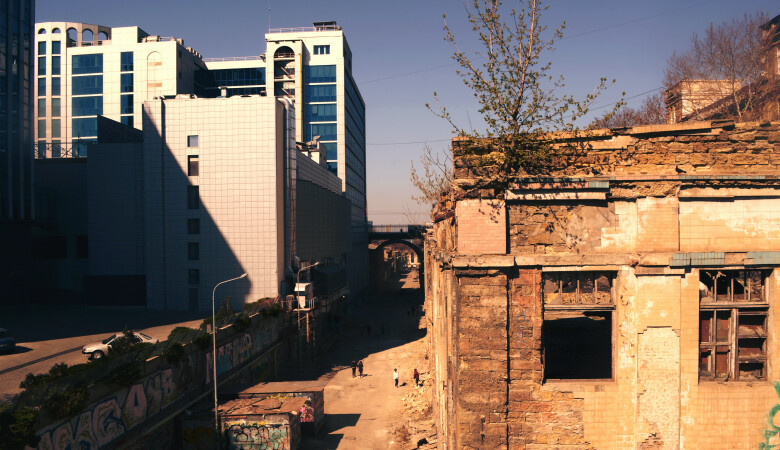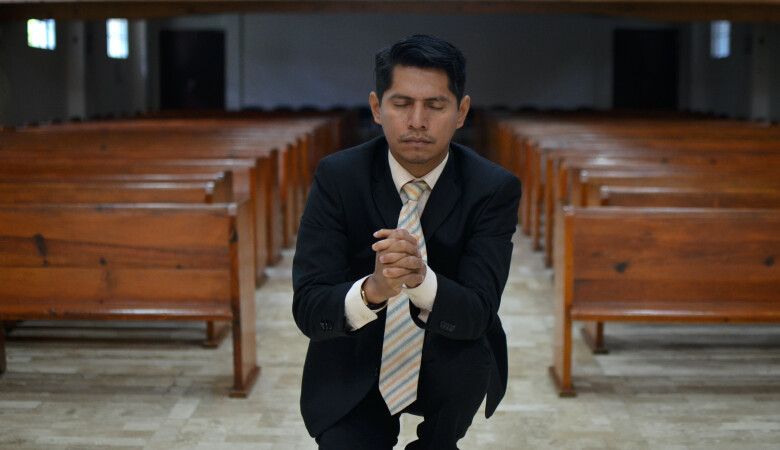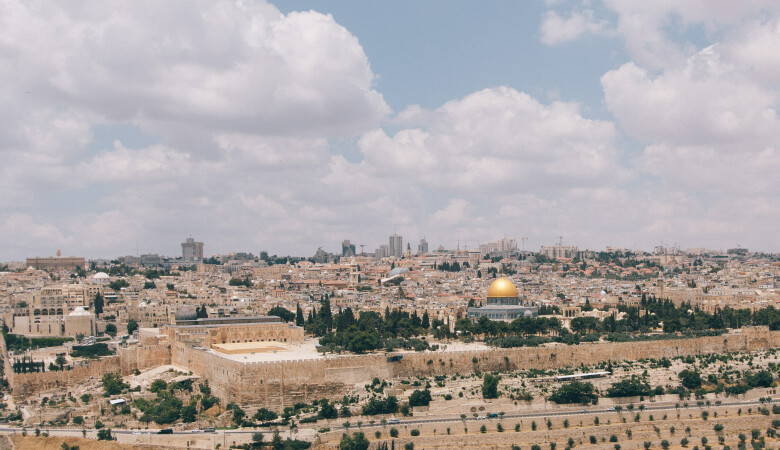Abraham Intercedes for Sodom and Gomorrah
August 15, 2004 | Andy Davis
Genesis 18:16-33
sermon transcript
Introduction
Look with me if you would, at Genesis Chapter 18. We are looking at a most remarkable passage of Scripture, you just heard it read, and it really is a passage that teaches us about faithful prevailing intercessory prayer. One of the great ministries of the church, one of the great privileges of the church, that we can stand in the gap on behalf of those in our generation, and we can intercede as Abraham, our father in faith did. You know, Scripture gives at least 190 exhortations or commands to prayer. Isn't that incredible? One hundred ninety times God has said, “Draw near to me and ask.” In James 5:16 it says, “The prayer of a righteous man is powerful and effective.” Abraham gives us a display of that in Genesis 18. Or, in 1 John 3 it says “whatever we ask we receive from him.” What an incredible exhortation of prayer that is. And how about this one? John 15:7 says, “If you abide in me and my words abide in you, ask whatever you wish, and it will be given to you.” What a blank check from heaven, of course, tempered by the will of God, but why would we want anything that is not in the will of God. And so, we stand, we intercede, we ask, and God has lavished to bless.
Matthew 21:22 says, “If you believe, you will receive whatever you ask for in prayer,” and many other such exhortations. Prayer is a proven active effectual reality in this world. Now, it is a mystery, and we see that mystery somewhat in the encounter between Abraham and God. God's plan and Abraham's initiative and his view of the thing as he stands on that ridge and looks down over those cities of Sodom and Gomorrah. But because it is proven and powerful and effective, and because there are so many commands and exhortations to prayer, the great men and women of God throughout time have taken up this prayer burden and have been faithful with it. Athanasius, for example, prayed five hours every day. Five hours every day. Bernard of Clairvaux would not begin his daily activities unless he had spent at least three hours in prayer. Augustine once set apart 18 months to do nothing but prayer.
Now, you can do that when you are a monk and you don't have to hold down a regular job, but that's all he did, 18 months focused on prayer. Charles Simeon devoted the hours from 4 till 8 every morning to prayer. John Wesley spent two hours daily in prayer beginning well before dawn. John Fletcher frequently spent all night in prayer and would greet his friends saying, do I meet you in prayer? In other words, I don't want to interrupt your prayer time. Martin Luther once commented very famously, “I have so much work to do that I have to give myself to an extra amount of prayer, perhaps three hours today.” Oh, that speaks to our busy 21st century, doesn't it? What do we do to prayer when it gets really busy? We pitch it. We don't have time for it. But not Luther. Now you say, “Well, I'm busy.” Now, Luther, he was just running a reformation, the local church pastor, meeting with heads of state, writing letters and the commentaries, and all of that.
God’s Intimate Public Revelation to Abraham About Sodom
But I know you are busy and so prayer is a challenge for you, and that's the very reason we're looking at Genesis 18 today. Francis Asbury rose each morning at 4 to spend time in prayer. John Calvin, John Knox and Theodore Beza covenanted together that they would hold each other accountable to pray at least two hours every day. And so, we see also in our text this morning, Abraham, our father in faith, in prevailing intercessory prayer, and that is what is in front of us. Now, what is the context of this account? Well, we began last week with Genesis 18, it is I think the context of intimacy with God, that is I think what holds the whole chapter together. We saw last week, the intimate fellowship meal as the Lord was there, I believe, with two angels and Abraham set before them a meal. And so, there is an intimate fellowship meal there, God with Abraham. And then, also God's intimate personal revelation to Abraham concerning Sarah, that this time next year he would return and Sarah would have a son, Isaac.
Angelic Mission to Sodom and Gomorrah
And so, there is an intimate personal revelation there, and so that is the context, and now thirdly, we see this intimate public revelation to Abraham, this time about Sodom. Look at Verses 16-21, it says “When the men got up to leave, they looked down toward Sodom, and Abraham walked along with them to see them on their way. Then the Lord said, ‘Shall I hide from Abraham what I'm about to do? Abraham will surely become a great and powerful nation, and all nations on earth will be blessed through him. For I have chosen him, so that he will direct his children and his household after him to keep the way of the Lord by doing what is right and just, so that the Lord will bring about for Abraham what he has promised him.’” Verse 20, “Then the Lord said, ‘The outcry against Sodom and Gomorrah is so great and their sin so grievous that I will go down and see if what they have done is as bad as the outcry that has reached me. If not, I will know.’” And so, there is this angelic mission to Sodom and Gomorrah, the two men look down towards Sodom and they go on their way.
This is God initiating a personal investigation into the situation in Sodom and Gomorrah. God says, “I will go down and see if what they have done is as bad as the outcry, then I will know.” This is what we call anthropomorphic language in which God kind of is speaking like we do. I'm going to take a trip and find out and see. We see this again and again in Genesis. You remember in Genesis 3, how Adam and Eve heard the sound of God as he was walking in the garden in the cool of the day, is what one translation says. It's this sense of the physicality of God or God kind of coming down to our level in a way we can understand. See the same thing in Genesis 11 with the Tower of Babel, you remember? You remember how God is looking down at this mighty tower that is rising up to the heavens, and God says, “Let's go way down and see that tiny little tower that they're making.” And so, down they travel to see. They had a long way to go to reach him. But it is again, this anthropomorphic language, and we see the same thing here, we'll go down and see if the outcry is as great, and if not, I will know.
So, there's a sense of immediacy here, a sense of involvement, God is intimately involved in this judgment. Now, it is not because God was near-sighted. It wasn't like he had to get closer to see. Have you ever seen somebody near-sighted and they're trying to read and they have to hold it just at the right length, or they have to get a little closer and squint? Oh, that isn't God. God knew everything, He knew every inclination of the heart of Sodom, He knew the whole history, He knew all of their wicked deeds, He was intimately aware of every filthy excruciating detail. Job says in Job 31:4, “Does he not see my ways and count my every step?” And it says in Proverbs 5:21, “For a man's ways are in full view of the Lord, and he examines all his paths.” Why then does God speak like this? Why this kind of language? I will go down and see, and then, if not, I will know. Well, I think the first purpose is to show God's absolute commitment to justice to Abraham and to us.
What He is going to do to Sodom and Gomorrah is noteworthy, to say the least. The cities are going to be erased by fire and brimstone, and immediately the sense of injustice may rise up, as it did with Abraham, and hence the intercession later on in this text. And so, God wants to show above all things a commitment absolutely to justice. God does nothing in wrath and judgment except what is deserved, and He is meticulously careful about preserving his reputation as a just judge. And so, he's going to investigate openly and clearly. It says in Romans 3:4, “Let God be true, and every man a liar. As it is written: ‘So that you may be proved right when you speak and prevail when you judge.’” And it says later in that same Chapter, “. . . so that every mouth may be silenced and the whole world held accountable to God.” And so, God uses this kind of language to show, “I have thoroughly and completely investigated this matter, and this is what the matter calls for. I have looked into it, and I am not going by hearsay, I will know intimately the situation in Sodom and Gomorrah.” That's the first reason.
The second reason is, I think, to involve the angels. He himself doesn't go, but through the two angels he does the investigation. Now realize that God doesn't need to use the angels, but He chooses to, and why? Because they are fellow servants with him. They are involved in the redemptive history as it unfolds, God wanted them involved. You know, interesting text in Revelation 19:10, John writing the Book of Revelation, after he had received this overwhelming vision from an angel. God had sent the angel to show His servants that says what must soon take place. John says “At this I fell at his feet to worship him. But he said to me, ‘Do not do it! I am a fellow servant with you and with your brothers who hold to the testimony of Jesus. Worship God!’” Did you hear what the angel called himself? A fellow servant. “I'm just doing a job; I'm serving just like you.”
The Outcry Against Wickedness: How Long Must God Bear It
And so, God wanted to involve the angels and so he sends the two of them down, and we'll see what happens to them in the next Chapter. But for this reason, we see this language and the outcry against wickedness. There's an outcry coming up from Sodom and Gomorrah, a clamor of wickedness, the boisterous noise of parties, or screams of wounded brawlers who are too drunk to know what's happened to them, or groans of sick drunkards or squeals of wild laughter, even worse, the outcry of blood from the ground of innocent victims. That's the outcry against Sodom and Gomorrah, and God will investigate. He will come and see if the outcry, if their deeds are as bad as the outcry, is it true?
God’s Deceptive Silence
And here ends very soon, God's misunderstood silence. You know, the wicked of the earth misunderstand God, don't they? When day after day is like the previous day, it seems as though God consents. The Scripture says that “The fool says in his heart, ‘There is no God,’” and they assume that there is no God. God says in another place, “you thought I was entirely like you because I didn't do anything but remain silent in heaven. And you thought I didn't exist, or you thought I was like you, wicked.” It is misunderstood silence. Rather, God is patient and He is waiting. His quiet encounter with Abraham is actually the calm before the storm of Genesis 19. And there comes a day, a day in which all things are made right.
God’s Desire for Intimacy with His People
We see also in this text, God's incredible desire for intimacy with his people. God cannot hide from Abraham what He is about to do. Look at Verse 17, “Then the Lord said, ‘Shall I hide from Abraham what I'm about to do?’” Now in Shakespeare's plays and in other plays, you get these things called soliloquies, an actor or actress goes off to a part of the stage or perhaps is completely alone on a stage, and they just speak for a while to the audience. It is the playwright's way of letting you know into the mind of the actor to find out what they're really thinking. And so, you get these soliloquies, because we can't read the mind of the actor or actress. And so, Hamlet gives a soliloquy about whether he wants to go on living or not, or other actors or actresses in these plays, they give these soliloquies, and this way we can read the minds of the actors or actresses. That's exactly what's going on here.
It's interesting that not only can God not hide from Abraham what He is about to do, He couldn't hide from us what He was thinking at the time. And so, through the pen of Moses, He says, “I want you to know the deliberations that went on in my mind right before this prayer encounter. I can't hide from Abraham what I'm about to do.” Realize that God is under no obligation to share a thing with us. He doesn't need to speak to us, He doesn't need to tell us a thing. He could have just erased Sodom and Gomorrah, He created it and everything in it. He doesn't owe us an explanation. Nebuchadnezzar said this in Daniel 4:35, “All the peoples of the earth are regarded as nothing. He does as he pleases with the powers of heaven and the peoples of the earth. No one can hold back his hand or say to him: ‘What have you done?’” No one has the right to question God. And do you sense that Abraham feels that too? Again and again, he's saying, “Oh Lord, don't be angry with me,” or “I'm only dust and ashes.”
And so, there's this sense, I don't have the right to ask these questions. But you see, God opens himself up, He reveals Himself to us. It says in Deuteronomy 29:29, “The secret things belong to the Lord our God, but the things revealed belong to us and to our children forever, that we may follow all the words of this law.” In other words, there are two categories of things in the mind of God, the things concealed, and the things revealed. And he decided that this judgement on Sodom, he would reveal beforehand, ahead of time. “Shall I hide from Abraham what I am about to do?” It says in Amos 3:7, “Surely the Sovereign Lord does nothing without revealing his secret to his servants the prophets. That's an incredible thing, God wants us to know. He wants to open himself up, He wants intimacy with you. And so, He has told you the most vital things you need to know about today and about the future in the Scripture. He's opened up his mind and his heart; He has told you what's going to happen.
Jesus Christ is coming back someday. The second coming of Christ, He is coming. And on that day, there will be a great judgment, and just like Abraham called God here, the judge of all the earth, He is the judge of all the earth and you will stand before him. More on that in a moment. You see, God reveals his secrets to us through His servants, the prophets. Now, what are the reasons for intimacy? Well, we've talked about this and we discussed it last week, but it bears repeating and looking at in detail. Look at Verses 18-19, it says, “Abraham will surely become a great and powerful nation, and all nations on earth will be blessed through him.” Verse 19, “For I have chosen him, so that he will direct his children and his household after him to keep the way of the Lord by doing what is right and just, so that the Lord will bring about for Abraham what he has promised him.” God has a generational or multi-generational view. He's looking down the road, and He has a purpose that He is unfolding here.
God’s Reasons for Intimacy: from Generation to Generation
Now, what is the ultimate purpose? What is the focus of the redemptive plan of God? Is it not Jesus Christ? Is Jesus not the focus of everything God is doing? It says that he will become a great and powerful nation, and all nations on earth will be blessed through Abraham. And so, Jesus Christ, the son of David, the son of Abraham, a descendant of Abraham, has come to bless the earth. But God knows there is a long journey to travel from here to there, and so he describes how that redemptive plan is going to unfold. It isn't here yet. The time for Jesus is still 2,000 years away. And so, there's a plan here, Abraham will become a great and powerful nation. At this time next year, I will return and Isaac will be born. And so, He has got a view down the road, and so, He has got to reveal Himself. And what does he reveal? Well, He says, first of all, “I have chosen Abraham so that he will direct his children and his household after him, to keep the way of the Lord by doing what is right and just, so that the Lord will bring about for Abraham, what He has promised him.”
There's a chain here, like a chain link, one after the other. First personal election, “I have chosen him.” The end result, all nations on earth will be blessed. But in the meantime, what? Well, “I've chosen him so that he will direct his family after him, to keep the way of the Lord, so that the Lord may bring about what he has purposed.” And so, we must be faithful just as Abraham was in training Isaac. We must be faithful with our children. I'll say more to fathers at the end of the message, but this is such a direct word to us, isn't it? The need for fathers to be faithful, to entrust to their children a godly heritage. And so, part of that is that God wants Abraham to know what he's doing in Sodom and Gomorrah. It wasn't just an anomaly of Nature, it wasn't just an accidental earthquake that just happened to destroy Sodom and Gomorrah, no, this is direct judgment from God. And it's important for Abraham and his descendants after to know the heart of God in this matter. It's important so that they could be warned and protected from sin.
God’s Perfect Holiness and Wrath
It says in Ephesians 5:3-7, “But among you there must not be even a hint of sexual immorality, or of any kind of impurity, or of greed, because these are improper for God's holy people. Nor should there be obscenity, foolish talk or coarse joking, which are out of place, but rather thanksgiving. For of this you can be sure: No immoral, impure or greedy person−such a man is an idolater−has any inheritance in the kingdom of Christ and of God. Let no one deceive you with empty words, for because of such things God’s wrath comes on those who are disobedient.” Don't you think He wants us to know that?
God’s Intimate Intercession with Abraham
God Initiates Prayer
We are Abraham's children by faith. And so, it's important that God draw near to us and warn us concerning the situation in Sodom and Gomorrah. That is why he reveals himself intimately to Abraham. He involves Abraham; He initiates prayer with Abraham. I think it's important as we look at this prayer encounter between Abraham and God, that God was both the Alpha and the Omega of this prayer encounter. It was God who drew near.
And so, He opens up his heart and He says to Abraham, look at Verses 20-21, “The outcry against Sodom and Gomorrah is so great and their sin is so grievous that I will go down and see if what they have done is as bad as the outcry that has reached me. And if not, I will know.”
And so, God reveals Himself, He shows himself to Abraham. You know that God doesn't need to use angels and He doesn't need to use people. He didn't need to use Noah's ark to save the animals, but He chose to do so. He involved Noah and his hammer and his saws and his sons in His redemptive plan. He didn't need to do anything with Moses. He could have rescued the people directly without Moses, but He chose to use Moses, his staff and his leadership; He chose to involve people. And in the same way, God doesn't need to send missionaries to the ends of the earth. He doesn't need to send missionaries to East Asia, He doesn't need to send missionaries to Greece or to Africa, but He has chosen to involve us in His work. And one of the number one ways we can be involved with God is, the same way Abraham was here, through intercessory prayer, that God initiates. Realize that we would have no access, no prayer life, if God had not granted it. It says in Verse 22, "The men turned away and went toward Sodom, but Abraham remained standing before the Lord."
God looked at Abraham and saw properly what he was. He was a sinner, saved by grace. He was justified by faith in a Christ who would come later and realize that none of us has access into the very presence of the holy throne room of God, except that Jesus shed His blood. He provided for us a new and living way into the throne of grace, and with it a command to come near, to draw near and let our consciences be sprinkled by the blood of Christ, to not stay distant. And we know that that's the problem in intercessory prayer. We are sinners and He is holy. It says in Isaiah 59, 1 and 2, "Surely the arm of the Lord is not too short to save, nor his ear too dull to hear. But your iniquities have separated you from your God; your sins have hidden his face from you, so that he will not hear." Only in Christ is that taken away, that obstacle to intercessory prayer. And so, Abraham stands before the Lord. The Lord has initiated, and Abraham is ready, and he stands before the Lord, to intercede.
Abraham’s Three Great Concerns in Prayer
There are three great concerns on Abraham's mind as he stands before them, and they are not equal. One is greater than the next and the next is greater than the third. Abraham's first and greatest concern is for the honor and glory of God and for his reputation as a just judge. That's his first and greatest concern. Abraham's second concern is for the righteous in the city of Sodom and Gomorrah. That's his second concern. Abraham's third concern is for the city generally, as created by God, and a concern that the city be spared on behalf of the righteous, that the wicked might have more time to repent. Those three are not equal in Abraham's mind. First and foremost, that God's reputation might be established. Look at Verse 25, this is Abraham speaking to God, "Far be it from you to do such a thing−to kill the righteous with the wicked, treating the righteous and the wicked alike. Far be it from you!" And then he says, a fascinating thing, "Will not the judge of all the earth do right?"
I was in a class at MIT, it was a Bible class. I have mentioned it before. I took two Bible classes at MIT. Just a word to those of you that are interested in pursuing theological education, MIT is not the place to go. Okay. If you're interested in engineering or pure science, whatever, look at it. It might be for you. But theology, no. And so, I took these two classes with some other Christian friends, and there are two different classes on the Bible, blasphemy and heresy 101, blasphemy and heresy 102, first semester, second semester. And the professor, it seemed like his number one job was to separate us from any confidence that the Bible was actually the inspired word of God, and it seemed like every class, all it was, was just finding details and issues in which he was bringing up problems with the Bible. And one of the things he brought up was Genesis 18:25, I'll never forget it. He said, "Now, it's an interesting question as Abraham stands before God and he says, ‘Shall not the judge of all the Earth do right?’” It's almost like there is a standard of rightness above God, and that God needs to bow the neck to the standard of righteousness, that God has got to yield to it, He's got to follow the rules, too. Now, that's an interesting thought, isn't it? Is there a standard of righteousness above God, that God has to follow, too?
Does He have to meet that standard or else He's not righteous? Well, let's put it this way. God is the standard of righteousness and God cannot behave contrary to His own nature. That's the issue, Abraham wants God to behave according to his own nature. That's all. Now, where did Abraham himself get the sense of what's right and wrong? Is it not because he was created in the image of God? And, therefore, is this not the moon reflecting rays back to the sun that gave it? The moon has no light of its own, only a reflected light. It came from the sun to begin with. And so here is this created being, created in the image of God, speaking back to God concerning righteousness. “Shall not the judge of all the Earth do right?” God does right all the time, everything He does is right, just as everything God does is loving, because God is love. Understand, God is not merely loving. You and I can be loving. We're not always loving, but we can be loving; but we cannot be love. That's something only God can be. And, we can behave righteously, but we cannot be righteousness. That's God.
“Shall not the judge of all the Earth do right?” That is Abraham's first concern, that the judge of all the earth's reputation as a righteous judge would be established here. Abraham's second concern is the righteous in the city. People misunderstand here. They say that he's interceding for lost people. Indirectly, he is because there's a concern for sparing the city. Would you spare the city for the sake of the righteous? You understand that. And so, the city is in his mind, but his request is focused on whom? Focused on the righteous. Are you going to sweep away the righteous with the wicked? Far be it from you, to do that. And so, his concerns are first, God's reputation as a just judge. Secondly, the salvation of the righteous. And who does he have in mind there? Well, like they say, blood is thicker than water. He's concerned about his nephew, Lot. Is Lot going to be swept away or is Lot going to be saved? I think he's counting Lot's family among the righteous. He's got a wife, he's got. . . If you start to add them up, you could get up to 10 people. I think he got to that point and said, "Okay, well, we've got Lot's family."
Well, apparently not, because the city got destroyed and God had promised He would not destroy it if there were 10 righteous people found in it. But there was Lot. And so, Abraham was concerned for the salvation of the righteous, and then thirdly, concerned with the city itself. He is interceding that the city would be spared for the sake of the righteous. God is concerned about that, too, because they are His created beings. It says in Jonah 4:11, "But Nineveh has more than a hundred and twenty thousand people who cannot tell their right hand from their left, and many cattle as well. Should I not be concerned about that great city?" Yeah, He's concerned about the cattle because He made them, but He's especially concerned about the 120,000 Ninevites who needed to repent. And so, there is a concern in that order.
Now, as you look at this time of intercession, it's really quite remarkable. Someone said it's like kind of a Middle Eastern bazaar, where there's a kind of a dickering back and forth, there's a bargaining. I don't think that's what's going on here, at all. I think there's a passion and a fear on Abraham's part. Do you see the fear? How he's afraid that he's asking too much, he's venturing forward timidly, kind of a step at a time? I think that's what's going on here. I don't think it's that he's trying to bargain with God. There is no such thing.
Abraham’s Character in Prayer
And as we look at Abraham's revealed character in this prayer, we see a number of things. First, I see faith. It's not directly mentioned, but what is faith but a response to the word of God. Faith doesn't generate anything. Faith responds to God's revealed Word. And so, God unfolds his purpose concerning Sodom and Gomorrah, and Abraham responds in faith by praying about it. Secondly, we do see intimacy, look at Verse 22, it says, "The men turned away and went toward Sodom, but Abraham remained standing before the Lord." There's a sense of standing before God, an intimate relationship. And then in Verse 23 it says, "Then Abraham approached him and said: ‘Will you sweep away the righteous with the wicked?’" Do you see the intimacy in Verse 23? Abraham drew near to God. Oh, is this only perfected through the finished work of Jesus Christ on the cross? Only by what He did on the cross, when He shed His blood and died, can there really be Immanuel. God with us or near us or in us, and us close to Him as well.
It says in Hebrews 10:22, "Let us draw near to God with a sincere heart in full assurance of faith.” Let us get close to God. Let us lay aside everything that hinders intimacy with God. So, we see intimacy. We see also compassion. He is concerned about what is going to happen to the people of Sodom and Gomorrah. There is a compassion there. He feels their pain and their agony before it even happens. That is what motivates his prayer. And so, he is compassionate. He is also bold, isn't he? Do you see boldness in this? Boy, is he courageous. He just keeps coming at it again and again, he even feels it. Look at Verse 25, he says, "Far be it from you to do such a thing−to kill the righteous with the wicked, treating the righteous and the wicked alike. Far be it from you! Will not the Judge of all the earth do right?" What a bold thing to say to God. And then he feels it in Verse 27, "Then Abraham spoke up again: ‘Now that I have been so bold as to speak to the Lord, though I am nothing but dust and ashes.’" Do you see the boldness in prayer? Do you see also the humility? He calls himself dust and ashes.
Is that hyperbole? Is that beyond what is really the case? Don't you remember what God said to Adam? "Dust you are and to dust you will return. I made you out of the dust of the earth." And Abraham accepted that, didn't he? He said, "I'm just dust, I'm just ashes." And so, there is a sense of humility and there is a sense of perseverance, isn't there? There is a relentlessness here−50 people, 45 people, 40 people, 30 people, 20 people, 10 people−six times he comes back to God with the same matter. Oh, this convicts me in my prayer. Are you this persistent in your prayer? When you ask and don't receive right away, do you keep on asking or do you give up quickly? Abraham kept on going, kept pressing on, persevering in prayer. And then finally, there's that reverence, the sense that Abraham standing there, is standing before the judge of all the earth, and now he's standing on behalf of some others. He is interceding on behalf of some others, but someday, he will stand himself before the judge of all the earth and he will be judged. And so, there is a reverence there, a sense of humility.
This is the character of Abraham in prayer, faith-filled, intimate, compassionate, bold, humble, persevering, reverent. That's the way we need to pray, isn't it? That's the way we need to pray.
Abraham’s “Failure” in Prayer?
Now, I want to take up a matter concerning Abraham's failure in prayer. Abraham's failure in prayer you might say, well, there is a godly man, E. M. Bounds who wrote a lot of books on prayer, perhaps you have seen them, “Purpose in Prayer,” or “Prayer and Praying Men,” some of these things. He was a godly man, lived in the 19th century, Christ-like in his demeanor, Methodist pastor in the 19th century in Tennessee and Alabama. He woke every morning, 4 a.m., for prayer. Once when he was visiting a friend and his family in Brooklyn, New York, the family was awakened by sounds in the middle of the night, it was 3 in the morning, and it was E. M. Bounds, crying out for the lost and for the needy in prayer. This is the way he was. Prayer just saturated his life. But as you sometimes get with that kind of theological approach with the Methodist in particular, there was too much, I think, a man-centered focus in prayer. And listen to what E. M. Bounds wrote about Abraham's encounter with God here, in Genesis 18. He said, "Sodom's fate was for a while, stayed by Abraham's praying, and was almost entirely relieved by the humility and insistence of the praying of this man who believed strongly in prayer and who knew how to pray."
Listen to this, "Perhaps the failure to ultimately rescue Sodom from her doom of destruction was due to Abraham's optimistic view of the spiritual condition of things in that city. It might have been possible, who knows, that if Abraham had entreated God once more and asked Him to spare the city if even one righteous man was found there, for Lot's sake, He might have heeded Abraham's request." Now, what is the basic idea? Abraham stopped too soon. He should have kept praying because we know there was one righteous man there, 2 Peter tells us that Lot was righteous, and so the city would have been spared. And so, there is almost a subtle blaming of Abraham for the destruction of Sodom and Gomorrah. Now E. M. Bounds would say, "Certainly not, because it was their own wickedness, but perhaps God might have extended the stay of righteous or of grace and mercy if he had only asked one more time.”
Abraham’s Success in Prayer
Well, I think there could be some confirmation of this in Abraham's own heart the next morning. Look over at Genesis 19, the very next chapter, 27 and 28, it says, "Early the next morning, Abraham got up and returned to the place where he had stood before the Lord." So, the next morning he goes to the place where he prayed. Verse 28, "He looked down toward Sodom and Gomorrah, toward all the land of the plain, and he saw dense smoke rising from the land, like smoke from a furnace." Have you ever felt like that was your prayer life? You asked for something and you get exactly the opposite, it seems, of what you asked for. And so, it seems as though perhaps he felt he had failed in prayer. But did he really fail? I think not. There is a clear statement, the very next one in Verse 29 of Chapter 19, look what it says, "So when God destroyed the cities of the plain, He remembered Abraham and He brought Lot out of the catastrophe that overthrew the cities where Lot had lived." He remembered Abraham. I don't think He just remembered that Abraham was related to him, I think directly, it's connecting to the previous chapter. He remembered his intercessory prayer; it was in response to the prayer that Lot was rescued, that he was delivered.
And also, did Abraham get what he was asking for? Were all the righteous saved from Sodom and Gomorrah? Seems that way. He got the second thing he asked for, namely that all the righteous would be delivered. They were. And actually, some who were not righteous were delivered out, Lot's daughters came out with him and his wife, although she didn't make it the whole way. We'll get to that, next time. But some that were not righteous made it out, too, so he got even more than he asked for. And at the moment when Abraham was standing there on the ridge, looking at the smoke rising up from Sodom and Gomorrah, where was Lot at that moment but in Zoar, that little city, safe with his daughters. God had answered his prayer even though he didn't know it. The whole problem I have with E. M. Bounds' approach is that, he forgot who the alpha and the omega of prayer is. Isn't that the problem? Who began this prayer encounter? God did. Yes. And who ended it? Well, let's look and see, Verse 33. It says, "When the Lord had finished speaking with Abraham, he left, and Abraham returned home."
Who ended the prayer time? God did. He stopped at 10. Right? Now, when a servant is standing before a king, who gets to end the encounter? Who gets to turn and walk away? Is it not the king? And what happens to the servant, if the servant turns and walks away, ending the encounter? He might get in trouble, serious trouble. And so, the servants stood before the king until the king was done, and the king was done at Verse 33, and He went back and ended the prayer encounter. It was God's purpose to destroy Sodom and Gomorrah. And so, he did not wait. But one more thing. Was not little Zoar spared in the exact way that Abraham had in mind? Lot went out to Zoar, and there was one righteous person in the little city of Zoar, and it was spared. All of it was spared because of Sodom. Now what, because of Abraham.
Application
What application can we take from this? Well, more than anything. Prevailing, passionate, intercessory prayer. How many of you would say you are satisfied with your prayer lives? How many of you can read this through and say, "Now, that's what I do on a regular basis?"
I have been deeply convicted by Genesis 18, and I have been convicted on behalf of our church. Can I urge you to take part in our corporate prayer life with our church? There is power in corporate prayer, there is power in coming together. Be at the next quarterly corporate prayer meeting, Sunday evening, the end of the month, be there. Pour out your heart to God in prayer for mission work and for lost people around you, and for the righteous people you know that they would stand firm in the day of temptation. Be there and pray. Be there with us on Sunday morning. We pray every morning, 9 o'clock in the parlor. I like to see that place so packed out, we have to come in here. I guess you got music, things going, we will work it out. Just pack it out, let's come and pray. We pray for half an hour, for the service and for mission work and for anything that we feel led to pray for. Come and pray at 9 o'clock, pray on Wednesday evening, but then let's fill out into other times. Yes, you can pray on Tuesdays, with brothers and sisters in Christ, you can get together and pray. Let's intercede. Let's be bold and courageous.
Let me speak also, to fathers. I have said this last week, I will say it again. Fathers, take responsibility for the spiritual welfare of your homes, take responsibility. Even if your kids are grown, still you have an influence over your grandkids. Fathers, take the lead as Abraham, our father in faith did. And mothers, you too. Parents are entrusted with the responsibility of training their children in godliness, the Book of Proverbs is clear on this. And so, have a multigenerational view. Lead your children to walk in a way that is right, don't leave it to the church ministry to do it. We are not here for that. We are here to exhort you to be faithful in your calling. And finally, all of you, but especially those of you who sit here today and don't know Jesus as your Lord and Savior, think of what Abraham said in Verse 25, "Will not the Judge of all the earth do right?" This is the God before whom each one of us will stand on Judgment Day, and only by the blood of Christ, will we survive that scrutiny, only by the blood of Christ, will we not be condemned for every careless word we have spoken throughout life.
Jesus shed His blood, that we might be able to stand before the judge of all the earth, blameless and unafraid. Trust in Him today. And those of you who have already trusted in Christ, remember, there will come that day when you stand and give an account for your life, for the things done in the body, whether good or bad.





